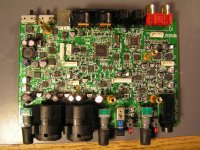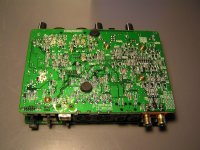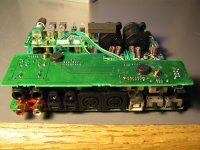Chord's DAVE seems to be using this approach, gets very highly rated. But then it is extremely expensive for a DAC...
An FPGA? Doing what, exactly?No DAC chip, but a FPGA, is it possible to achieve groundbreakable level?
Switching an R2R network? Isn't that what the Soekris DAC is?
Delta-sigma modulation?
Extracting excess money from the pockets of audiophiles?
Fulfilling the duties of a DAC without the necessity for an additional DAC chip. Seems to be what the Chord Dave does. Anyone have any idea how to implement such a thing in an FPGA like the Spartan 6? Please share or pm me.
There are a number of dedicated chips which implement the functions of a DAC without needing an additional DAC chip. For example TI has its range of PWM processors, as does ST.
http://www.ti.com/lit/ds/symlink/tas5508.pdf
http://www.ti.com/lit/ds/symlink/tas5508.pdf
No DAC chip, but a FPGA, is it possible to achieve groundbreakable level?
There's little preventing someone more enterprising from baking a lot of the distributed logic of an r-2r DAC (e.g. Soekris's offering) into a single FPGA.
IMO, not worth it. Either put your money and sweat into an existing solution or deep-dive into one of the highest-end audio DAC ASICs and implement it to an inch of its life. (Which would still provide a LOT of intellectual challenge)
Here's an interesting video of the designer of what many consider to be the best DAC in the world - the Dave - describing his work: https://www.youtube.com/watch?v=80iu7ifXsOo. The specs are significantly more impressive than any other DAC that I know of.
I don't think the design has anything to do with an R2R dac and to me the technology implemented in the dave - from what I can tell 100+ dsp operations happening simultaneously, is way beyond the capabilities of the top Delta Sigma and R2R chips/discrete available today. I just purchased a Gustard A20H on a whim. In my research and experience with AKM chips, I'm looking forward to hearing it very much. The newly released AKM AK4497 and ESS9038 will render all previous DACs obsolete in my opinion (my opinion). However if funds permitted, I'd skip the likes of MSB, TotalDAC (have extensive experience with Zfoil resistors though and they're amazing), Esoteric (which features the AK4497 in their flagship $20,000 SACD player), and so on, and purchase a Chord Dave. Unfortunately the Hugo is just too barebones and feature limited to justify the cost. Until traction around a DIY project of the sort mentioned in the OP gains some traction, I can only dream.
I don't think the design has anything to do with an R2R dac and to me the technology implemented in the dave - from what I can tell 100+ dsp operations happening simultaneously, is way beyond the capabilities of the top Delta Sigma and R2R chips/discrete available today. I just purchased a Gustard A20H on a whim. In my research and experience with AKM chips, I'm looking forward to hearing it very much. The newly released AKM AK4497 and ESS9038 will render all previous DACs obsolete in my opinion (my opinion). However if funds permitted, I'd skip the likes of MSB, TotalDAC (have extensive experience with Zfoil resistors though and they're amazing), Esoteric (which features the AK4497 in their flagship $20,000 SACD player), and so on, and purchase a Chord Dave. Unfortunately the Hugo is just too barebones and feature limited to justify the cost. Until traction around a DIY project of the sort mentioned in the OP gains some traction, I can only dream.
FPGA Vs ASIC Vs OEM Sokeris
Hi DPH,
I am interested in designing (TBO, paying for someone else to design it!) an FPGA solution, but your suggestion of a ASIC solution also sounds like an option...?
I am way out of depth when it comes to the tech talk.....Could you please explain in simple terms the general principals /pro's / cons of FPGA Vs ASIC Vs an OEM vesion of the Sokeris or similar?
Thanks for your time and all the best
Derek.
There's little preventing someone more enterprising from baking a lot of the distributed logic of an r-2r DAC (e.g. Soekris's offering) into a single FPGA.
IMO, not worth it. Either put your money and sweat into an existing solution or deep-dive into one of the highest-end audio DAC ASICs and implement it to an inch of its life. (Which would still provide a LOT of intellectual challenge)
Hi DPH,
I am interested in designing (TBO, paying for someone else to design it!) an FPGA solution, but your suggestion of a ASIC solution also sounds like an option...?
I am way out of depth when it comes to the tech talk.....Could you please explain in simple terms the general principals /pro's / cons of FPGA Vs ASIC Vs an OEM vesion of the Sokeris or similar?
Thanks for your time and all the best
Derek.
An ASIC DAC and the FPGA as implemented in the Chord seem very different in my understanding. An ASIC dac would = all dacs not including the DAVE and discrete dacs like the TotalDAC. If going this route, I expect the aforementioned AKM and ESS chips to be the best option. http://www.ti.com/lit/an/snaa129/snaa129.pdf
From what I can tell, the Dave implements decimation filtering/sample rate reduction to eliminate aliasing --> waveform 'rebuilt' using a 'waveshaper' which is akin to 'infinite oversampling.'
The pros I see of an FPGA implementation is a significantly more advanced and complex process, compared with a standard DAC chip, all occurring in a single IC, resulting in a much simpler overall design.
From what I can tell, the Dave implements decimation filtering/sample rate reduction to eliminate aliasing --> waveform 'rebuilt' using a 'waveshaper' which is akin to 'infinite oversampling.'
The pros I see of an FPGA implementation is a significantly more advanced and complex process, compared with a standard DAC chip, all occurring in a single IC, resulting in a much simpler overall design.
Last edited:
Using an FPGA does not have to be expensive. The Edirol FA66 is a good example of a very good cheap DAC based on such.
dave
dave
Rob Watts has been doing this over 20yrs; while the Chord Mojo, Hugo and Dave exemplify what is possible now, the work started with his work at Deltec Precicison Audio and everything from the PDM1024 onward.
I have a DPA SX256 amongts other things - still sounds great...
I have a DPA SX256 amongts other things - still sounds great...
Hi DPH,
I am interested in designing (TBO, paying for someone else to design it!) an FPGA solution, but your suggestion of a ASIC solution also sounds like an option...?
I am way out of depth when it comes to the tech talk.....Could you please explain in simple terms the general principals /pro's / cons of FPGA Vs ASIC Vs an OEM vesion of the Sokeris or similar?
Thanks for your time and all the best
Derek.
I want to be forthright--we're talking something seriously non-trivial. So to tackle your question thoroughly is beyond my scope here.
Just to get us off on the right foot:
FPGA = field programmable gate array. The breadth of options here are dizzying. But, in short, you'll be looking at something with a large amount of programmable logic with a moderate amount of fixed logical blocks.
It allows one to bake into logic/pipelines algorithms that would otherwise require interpretation by a more general-purpose processor and it's baked-in data pipelines.
ASIC = application specific integrated circuit. This is really a catch-all term for fixed logic circuits. So that's everything from a DAC chip, to a human interface chips in your cell phone, to fixed pipeline audio DSP chips, to gigantic stream processors used in modern workstations/supercomputers.
So in more easily couched terms, with an appropriate FPGA, one could flesh out a DSP pipeline (resampling/noise shaping/etc) and perhaps even a lot of the control logic for a downstream DAC. It's still in the digital domain, however, within the constructs of the FPGA, although that distinction get really blurry really quickly when you're talking about mixed-mode signals.
So if you're really, really, really gung ho about a new DAC topology/implementation, you're going to have to go to a bespoke solution (where you'll need that FPGA), which you'd better *really* know what you're getting into (I don't pretend I do).
If you look hard at the top-end DAC chips available from the likes of AKM/TI/ESS/Cirrus/etc, it makes it hard to say, "I can do a better DAC than them". But implementing one of these chips and squeezing every last drop out of its performance is no child's play either, given the PPB error rates being specified. The analog circuitry, PSU, and layout need to be all there to realize the full benefit of those DACs.
Doesn't the FA66 use an AKM4385?
My tech says the FA-66 i have has no DAC chip.
I have pictures of the inside if you want to do a check to see if that is right.
dave
Dave, a look at the chips involved (unless their markings are gone) would go a long ways to closing that loop. (I have no dog in the fight!)
There's at least one AKM chip on there (which could easily be the ADC), although I'm having a devil of a time reading much more. Thanks for getting those, Dave.
AK4114? A 192/24 digital audio interface transceiver.
I have examined my boards, pulled as many numbers off the interesting chips as i could and looked them up.
dave
I have examined my boards, pulled as many numbers off the interesting chips as i could and looked them up.
dave
I made the assumption regarding the DAC chip based on information from this thread:
https://www.gearslutz.com/board/gee...udio-interfaces-their-ad-da-chips-listed.html
If it's true that the FA66 implements methods alluded to in this discussion then that's very interesting. Either way I'm sure it's a great piece of gear for the price.
https://www.gearslutz.com/board/gee...udio-interfaces-their-ad-da-chips-listed.html
If it's true that the FA66 implements methods alluded to in this discussion then that's very interesting. Either way I'm sure it's a great piece of gear for the price.
- Status
- Not open for further replies.
- Home
- Source & Line
- Digital Line Level
- Serious talk: No DAC chip, but a FPGA?



